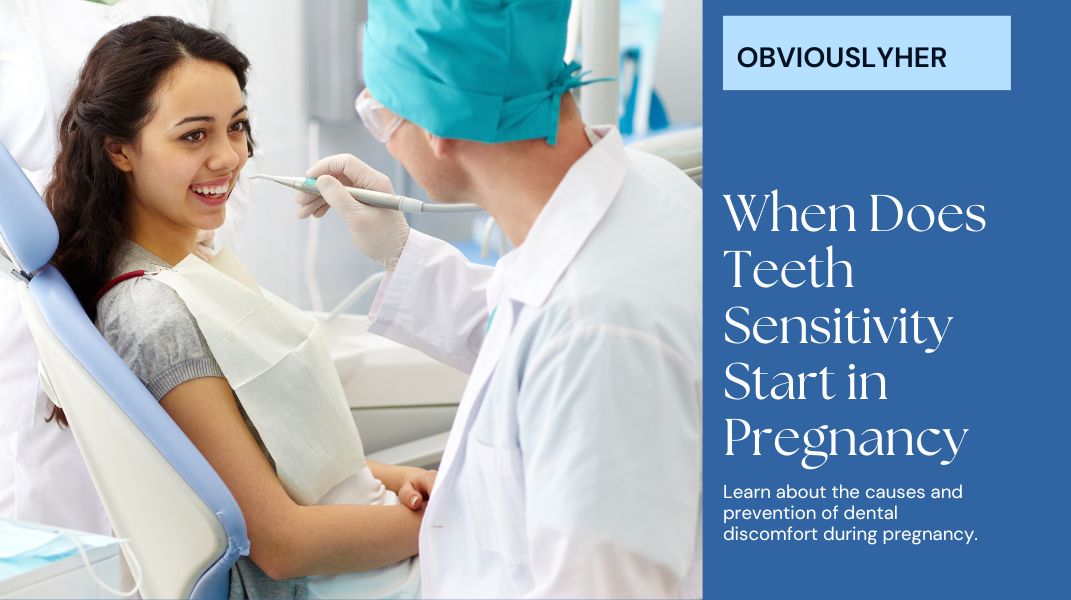When Does Teeth Sensitivity Start in Pregnancy? Teeth sensitivity can start in pregnancy due to hormonal changes, which can make the gums more sensitive and swollen. These changes increase blood flow through the gums, leading to soreness in teeth and gums.
Taking a pregnancy test can confirm if pregnancy is the cause, and a visit to the dentist can provide further clarification. It’s important for pregnant women to be aware of these potential dental issues and take appropriate measures to maintain oral health throughout pregnancy.

Credit: www.smilearizonadentistry.com
Understanding Teeth Sensitivity
Pregnancy can cause hormonal changes that increase blood flow to the gums, making them more sensitive and swollen. This can lead to tooth and gum discomfort, which can be confirmed by taking a pregnancy test and visiting a dentist for further evaluation.
Definition Of Teeth Sensitivity
Teeth sensitivity, also known as dentin hypersensitivity, refers to the discomfort or pain experienced when the teeth come into contact with certain stimuli, such as hot or cold food and drinks, sweet or acidic substances, or even cold air. This sensitivity is usually felt as a sharp, sudden sensation that can be mild or severe, depending on the individual. It occurs when the protective enamel on the teeth is worn down or when the gumline recedes, exposing the underlying layer of dentin, which contains tiny tubules that lead to the nerve of the teeth.
Common Causes Of Teeth Sensitivity
Several factors can contribute to teeth sensitivity during pregnancy:
1. Hormonal changes: Pregnancy hormones can affect the body’s response to bacteria and inflammation, making the gums more susceptible to infection and irritation. This can lead to gum recession and increased sensitivity.
2. Increased blood flow: During pregnancy, there is increased blood flow to the gums, causing them to become swollen and sensitive. This can exacerbate existing tooth sensitivity or contribute to new sensitivity.
3. Changes in oral hygiene habits: Some pregnant women may experience morning sickness or have food aversions, which can lead to modified oral hygiene habits. Poor oral hygiene can increase the risk of gum disease and tooth sensitivity.
4. Dietary changes: Pregnancy cravings and changes in eating habits can lead to an increased consumption of acidic or sugary foods, which can erode enamel and contribute to tooth sensitivity.
5. Teeth grinding or clenching: Pregnancy can bring about added stress or anxiety, leading to teeth grinding or clenching, also known as bruxism. This can wear down the enamel and expose the sensitive dentin layer.
Impact Of Teeth Sensitivity On Oral Health
Teeth sensitivity during pregnancy can affect oral health in several ways:
1. Discomfort or pain: Sensitive teeth can make eating and drinking uncomfortable, especially when consuming hot or cold foods/drinks or foods that are sweet or acidic. This can lead to changes in eating habits and potential nutrient deficiencies.
2. Poor oral hygiene: The discomfort associated with sensitive teeth may discourage regular brushing and flossing, leading to plaque buildup, tooth decay, and gum disease.
3. Gum issues: Sensitivity may be accompanied by gum recession and inflammation, increasing the risk of gum disease. Gum disease during pregnancy has been linked to adverse pregnancy outcomes, such as preterm birth and low birth weight.
4. Dental complications: If left untreated, sensitive teeth can lead to more severe dental issues, such as cavities, tooth fractures, or even tooth loss. It is important to address teeth sensitivity during pregnancy to prevent further complications.
In conclusion, understanding teeth sensitivity during pregnancy is crucial for maintaining good oral health. By being aware of the common causes and impacts of teeth sensitivity, pregnant individuals can take proactive steps to manage and prevent further complications. Regular dental check-ups, maintaining proper oral hygiene, and making dietary adjustments can help alleviate sensitivity and promote overall oral well-being during this special time.

Credit: www.unicorndenmart.com
When Does Teeth Sensitivity Start In Pregnancy
Experiencing sore teeth during pregnancy may be a result of hormonal changes. To confirm if pregnancy is the cause, it is recommended to take a pregnancy test and visit a dentist for further examination. Pregnancy gingivitis, characterized by swollen and sensitive gums, is most commonly experienced during the second trimester.
Effects Of Hormonal Changes
Hormonal changes during pregnancy can have various effects on a woman’s body, including on their teeth. These changes stimulate blood flow to sensitive areas in the mouth, making the teeth more susceptible to sensitivity. The increased blood flow can cause the gums to become more sensitive and swollen, leading to discomfort and pain.
Timeline Of Teeth Sensitivity During Pregnancy
Teeth sensitivity during pregnancy can occur at different stages. While pregnancy gingivitis, which is inflammation of the gums, can occur anytime between the first and third trimester, it is usually most severe during the second trimester when hormonal changes are at their peak. This increased sensitivity may persist throughout pregnancy or subside after childbirth.
Prevalence Of Teeth Sensitivity In Pregnant Women
Teeth sensitivity is a common concern among pregnant women. It is estimated that around 50-70% of pregnant women experience some level of teeth sensitivity. The hormonal changes and increased blood flow during pregnancy contribute to this prevalence. It is important for pregnant women to maintain good oral hygiene and seek appropriate dental care during this time to manage and alleviate teeth sensitivity.
Causes Of Teeth Sensitivity During Pregnancy
When it comes to dental health, pregnancy can bring about some unexpected changes. Many women experience teeth sensitivity during pregnancy, which can range from mild discomfort to sharp pain. There are several causes for teeth sensitivity during this time:
Increased Blood Flow To The Gums
One of the main causes of teeth sensitivity in pregnancy is the increased blood flow to the gums. This increased circulation is a result of hormonal changes in the body. As a result, the gums become more sensitive and can easily become irritated. This can lead to sensitivity and discomfort when eating or brushing the teeth.
Changes In Oral Ph Levels
Another factor that can contribute to teeth sensitivity during pregnancy is the changes in oral pH levels. Hormonal changes can alter the pH balance in the mouth, creating an environment that is more acidic. This acidity can damage the enamel of the teeth, making them more sensitive to hot, cold, or sweet foods.
Hormonal Changes Affecting Tooth Enamel
During pregnancy, the body experiences significant hormonal changes. These hormonal fluctuations can affect the enamel of the teeth, causing it to become weaker and more prone to sensitivity. The hormonal changes can also lead to an increased risk of developing gum disease, which can further contribute to teeth sensitivity.
In conclusion, teeth sensitivity during pregnancy can be attributed to several factors. The increased blood flow to the gums, changes in oral pH levels, and hormonal changes affecting tooth enamel can all contribute to this common issue. It is important for pregnant women to take extra care of their oral health during this time and to seek dental advice if they experience any discomfort or sensitivity.
Effects Of Teeth Sensitivity During Pregnancy
When it comes to pregnancy, there are a myriad of changes that a woman’s body goes through. One such change that many expectant mothers may experience is teeth sensitivity. This can be discomforting and even painful, impacting daily routines and oral health practices. Understanding the effects of teeth sensitivity during pregnancy is crucial for expectant mothers to maintain their oral health.
Discomfort And Pain
During pregnancy, hormonal changes can cause increased blood flow to sensitive areas in the mouth, leading to discomfort and pain. This can result in sensitivity to hot or cold food and beverages, as well as to touch and pressure while brushing or flossing. The discomfort and pain can vary in intensity, affecting the overall well-being of the expecting mother.
Impact On Oral Hygiene Practices
Teeth sensitivity during pregnancy can greatly impact oral hygiene practices. Due to the discomfort and pain, expectant mothers may feel reluctant to brush or floss their teeth effectively. This can lead to a decline in oral hygiene, putting them at a higher risk of developing other oral health problems such as cavities or gum diseases. It is important for pregnant women to maintain good oral hygiene habits and seek alternative methods to alleviate teeth sensitivity.
Potential Oral Health Complications
Teeth sensitivity during pregnancy can potentially lead to oral health complications if left untreated. The increased sensitivity may cause expectant mothers to avoid certain foods or beverages, resulting in nutrient deficiencies that can indirectly affect their overall health and the health of their developing baby. Additionally, if proper oral hygiene practices are not maintained, it can lead to the development of cavities or gum diseases, which can further contribute to discomfort and pain.
In conclusion, teeth sensitivity during pregnancy can have significant effects on an expectant mother’s daily life and oral health. It is essential for pregnant women to be aware of the discomfort and pain associated with teeth sensitivity, the impact on their oral hygiene practices, and the potential oral health complications that may arise. By staying vigilant and seeking appropriate dental care, they can minimize the effects of teeth sensitivity and maintain optimal oral health throughout their pregnancy journey.
Managing Teeth Sensitivity During Pregnancy
Experiencing sore teeth and gums during pregnancy may be a sign of hormonal changes. Taking a pregnancy test can help determine if pregnancy is the cause, while a visit to the dentist can confirm it. Pregnancy gingivitis, characterized by sensitive and swollen gums, is most severe during the second trimester.
When you’re expecting, hormonal changes can lead to a variety of symptoms, including teeth sensitivity. The increased blood flow and hormonal fluctuations can make your gums more sensitive and prone to inflammation. So, how can you manage teeth sensitivity during pregnancy? Here are a few strategies to help you out:
Maintaining Good Oral Hygiene
Proper oral hygiene practices are crucial during pregnancy to prevent teeth sensitivity. Make sure to:
- Brush your teeth at least twice a day using a soft-bristled toothbrush
- Floss daily to remove plaque buildup
- Use an antimicrobial mouthwash after brushing and flossing
- Visit your dentist regularly for check-ups and cleanings
Using Desensitizing Toothpaste
Desensitizing toothpaste can help relieve tooth sensitivity during pregnancy. Look for toothpaste specifically formulated for sensitive teeth and apply it to your brush before each brushing session. These toothpastes contain ingredients that help block the sensations that cause sensitivity, providing you with relief.
Dietary Changes To Reduce Sensitivity
The foods and drinks you consume can also impact teeth sensitivity during pregnancy. Consider making the following dietary changes:
- Avoid consuming acidic foods and beverages like citrus fruits, tomatoes, and sodas
- Limit your intake of sugary foods and drinks as they can contribute to tooth decay
- Increase your consumption of calcium-rich foods like dairy products, leafy greens, and almonds to promote tooth health
By adhering to these strategies, you can effectively manage teeth sensitivity during pregnancy. Remember, maintaining good oral hygiene, using desensitizing toothpaste, and making appropriate dietary changes are essential for keeping your teeth healthy and comfortable throughout this exciting time.
Visiting The Dentist During Pregnancy
During pregnancy, it is important to prioritize your overall health, including your dental health. Many women experience changes in their oral health during this time, including teeth sensitivity. Fortunately, visiting the dentist during pregnancy is not only safe but also essential for maintaining a healthy mouth. Regular dental check-ups ensure that any potential issues are addressed promptly, allowing you to have a comfortable and worry-free pregnancy.
Importance Of Regular Dental Check-ups
Regular dental check-ups are crucial, especially during pregnancy, as they help monitor and prevent dental issues. Pregnancy hormones can make some women more prone to gum problems such as gingivitis, which is inflammation of the gum. This condition is more likely to occur during the second trimester and can cause swelling and bleeding of the gums. By visiting the dentist regularly, any signs of gingivitis can be detected early, and proper treatment can be provided, ensuring the health of both you and your baby.
Safe Dental Treatments During Pregnancy
It is natural to have concerns about the safety of dental treatments during pregnancy. However, rest assured that many dental procedures can be safely performed at any stage of pregnancy. Most routine dental treatments, including dental cleanings, fillings, and even X-rays, can be carried out with appropriate precautions. Dentists are trained to handle pregnant patients and take necessary measures to ensure the safety of both the mother and the baby.
| Safe Dental Treatments During Pregnancy: |
|---|
| Dental cleanings |
| Fillings |
| X-rays with proper shielding |
| Emergency dental treatments |
Addressing Teeth Sensitivity With The Dentist
If you experience teeth sensitivity during pregnancy, it is important to discuss it with your dentist. Teeth sensitivity can be caused by hormonal changes and increased blood flow to the sensitive areas of the mouth. Your dentist can evaluate the cause of your sensitivity and recommend suitable treatments or desensitizing measures. They may also provide guidance on oral hygiene practices to alleviate the discomfort and maintain oral health during pregnancy.
Remember, dental health is an integral part of overall well-being, and taking care of your teeth and gums during pregnancy is vital. By visiting the dentist regularly, you can address any dental issues promptly and ensure a healthy smile for both you and your little one.
Visit our other website to read/see/buy women best products;
Preventing Teeth Sensitivity In Pregnancy
During pregnancy, hormonal changes can lead to various dental issues, including teeth sensitivity. However, there are preventive measures that can be taken to minimize the occurrence of teeth sensitivity and maintain good oral health throughout this period. By taking action before pregnancy, maintaining oral hygiene during pregnancy, and implementing protective techniques during dental procedures, you can significantly reduce the risk of teeth sensitivity. Let’s explore each of these strategies in detail.
Taking Preventive Measures Before Pregnancy
Prior to getting pregnant, it is essential to establish a solid foundation for dental health. Here are some steps you can take:
- Schedule a dental check-up to identify and treat any existing dental issues, such as cavities or gum disease.
- Ensure that your teeth are cleaned professionally to remove plaque and tartar buildup.
- Discuss your plans for pregnancy with your dentist, as they can provide personalized advice and recommendations.
- Adopt a thorough oral hygiene routine, including proper brushing techniques and regular flossing.
Maintaining Oral Health During Pregnancy
While pregnancy can bring about hormonal changes that impact dental health, it is crucial to prioritize oral hygiene during this time:
- Continue with regular dental check-ups and cleanings throughout your pregnancy.
- Brush your teeth at least twice a day using a soft-bristled toothbrush and fluoride toothpaste.
- Floss daily to remove plaque and food particles that may contribute to sensitivity.
- Avoid sugary snacks and drinks that can increase the risk of tooth decay.
- Consider using a fluoridated mouthwash as recommended by your dentist.
- Stay hydrated to promote saliva production, which helps protect teeth and gums.
Using Protective Techniques During Dental Procedures
If you require dental treatments or procedures during pregnancy, it is important to take precautions to minimize the risk of teeth sensitivity:
- Inform your dentist about your pregnancy so that they can tailor the treatment accordingly.
- Consider postponing non-essential dental work until after your baby is born, particularly during the first and third trimesters.
- Ask your dentist to use dental dams or topical fluoride treatments to protect your teeth during procedures.
- Ensure that dental X-rays are avoided or minimized, with the use of lead aprons for protection if necessary.
By following these preventive measures, you can safeguard your dental health and minimize the chances of teeth sensitivity during pregnancy. Remember to consult with your dentist for personalized advice and recommendations based on your specific needs. With proper care and attention, you can maintain a healthy smile throughout this transformative period.

Credit: www.smilearizonadentistry.com
Common Myths About Teeth Sensitivity In Pregnancy
Teeth sensitivity in pregnancy is often attributed to hormonal changes, which can occur anytime between the first and third trimester. These hormonal changes can lead to increased blood flow to the gums, causing sensitivity and swelling. However, a visit to the dentist is necessary to confirm if pregnancy is the cause of tooth sensitivity.
During pregnancy, many women experience teeth sensitivity, which can be uncomfortable. However, there are several common myths surrounding this issue. It’s important to debunk these myths to ensure that pregnant women have accurate information about their oral health. In this article, we will address three common myths about teeth sensitivity in pregnancy:
Myth 1: Teeth Sensitivity Is A Normal Part Of Pregnancy
Contrary to popular belief, teeth sensitivity is not an inevitable part of pregnancy. While it is true that hormonal changes during pregnancy can affect oral health, such as increased blood flow to the gums and increased acidity in the mouth, not all pregnant women experience teeth sensitivity. Sensitivity can also be a result of pre-existing dental issues or inadequate oral hygiene.
Myth 2: Dental Treatments Should Be Avoided During Pregnancy
It is a common misconception that dental treatments should be avoided during pregnancy. In fact, maintaining good oral health is crucial during this time. Delaying necessary dental treatments can lead to further complications and potential harm to both the mother and the baby. However, it is important to inform your dentist about your pregnancy and ensure that any dental treatments are performed safely.
Myth 3: Teeth Sensitivity Will Disappear After Childbirth
While some women may experience relief from teeth sensitivity after childbirth, it is not guaranteed to go away completely on its own. Hormonal changes during pregnancy can have long-lasting effects on oral health, and any dental issues that occurred during pregnancy may require ongoing treatment. It is essential for women to continue practicing good oral hygiene habits and to visit their dentist regularly, even after giving birth.
Frequently Asked Questions For When Does Teeth Sensitivity Start In Pregnancy
Is Sensitive Teeth An Early Pregnancy Symptom?
Sensitive teeth can be a possible early symptom of pregnancy due to hormonal changes. To confirm if pregnancy is the cause, take a pregnancy test and consult a dentist.
How Early Does Gum Sensitivity Start In Pregnancy?
Gum sensitivity in pregnancy can start anytime between the first and third trimester. Hormonal changes increase blood flow to the gums, making them more sensitive and swollen. Pregnancy gingivitis is usually most severe during the second trimester. Taking a pregnancy test and visiting a dentist can confirm if pregnancy is the cause of tooth sensitivity.
Do You Get Tooth Pain In Early Pregnancy?
Tooth pain can occur during early pregnancy due to hormonal changes, increased blood flow to sensitive areas in the mouth, and potential issues with wisdom teeth. Sore teeth and gums may indicate hormonal changes, but it’s important to take a pregnancy test and visit a dentist for confirmation and appropriate treatment.
When Do Teeth Problems Start In Pregnancy?
Teeth problems, such as gingivitis (inflammation of the gum), can start in pregnancy during the second trimester. Hormonal changes increase blood flow to the gums, making them more sensitive and swollen. Symptoms include bleeding and swelling while brushing and flossing.
Experiencing sore teeth may indicate hormonal changes, but a visit to the dentist can confirm the cause.
Is Teeth Sensitivity A Common Symptom Of Pregnancy?
Sensitive teeth can be a common symptom of pregnancy due to hormonal changes causing increased blood flow to the gums.
When Does Teeth Sensitivity Typically Start During Pregnancy?
Teeth sensitivity in pregnancy can start as early as the first trimester and may continue throughout the pregnancy.
What Causes Teeth Sensitivity During Pregnancy?
Teeth sensitivity during pregnancy is often caused by hormonal changes, which can result in increased sensitivity to hot and cold temperatures.
How Can I Reduce Teeth Sensitivity During Pregnancy?
To reduce teeth sensitivity during pregnancy, make sure to maintain good oral hygiene, use a soft-bristled toothbrush, and avoid acidic and sugary foods.
Can Teeth Sensitivity During Pregnancy Affect The Baby?
Teeth sensitivity during pregnancy does not directly affect the baby, but it’s important to maintain good oral health for overall well-being.
Does Teeth Sensitivity During Pregnancy Require Dental Treatment?
If teeth sensitivity during pregnancy becomes severe or causes extreme discomfort, it is advisable to consult a dentist for proper evaluation and treatment.
Conclusion
Teeth sensitivity can start during pregnancy due to hormonal changes. The increased blood flow to the gums can make them more sensitive and swollen. If you experience sore teeth and gums, it may indicate pregnancy-related hormonal changes. Taking a pregnancy test and visiting a dentist can help confirm if pregnancy is the cause.
It’s important to maintain good oral hygiene during pregnancy to prevent and manage gum problems.




